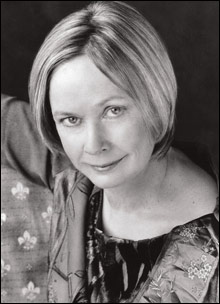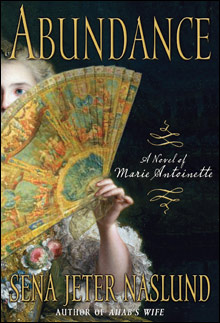
FIRST PERSON: Naslund’s Marie is a kind of human bonsai — pretty but stunted, she wins your sympathy. |
Reimagining the past, as historical novelists must do, is difficult. Particularly if you’re dealing with a well-known figure, you’re stuck with the facts, the dates and deaths, and in the space between you must create something both appropriate and interesting. Reviving a historical personage in a first-person narrative is harder still: what you get in tension (the character doesn’t know how her life ends), you lose in perspective. If your chosen protagonist is naive and barely literate, the challenges rise further. Which all adds up to the question of why Sena Jeter Naslund decided to spend 500 pages fictionalizing the brief life of Marie Antoinette. And even more, how she succeeded.
As with her breakthrough novel, Ahab’s Wife, the answer lies in the distinctive and intimate first-person voice. The Marie Antoinette we meet, nude and shivering on an island in the Rhine, isn’t much of a person. Fourteen years old and physically undeveloped, she has shed her Austrian attire to take on French clothes, and her new role as Dauphine, betrothed to the heir to the throne of France. Her voice is still that of her mother, the Empress of Austria, whom we hear echoed as young Marie states, “I am always in her prayers.” The instructions she calls to mind further the impression of innocence: “We will copulate through the door at the bottom of my body; next, I become pregnant. Nine months after my marriage I give birth to a baby.”
To those who know her history, such prosaic recitations foretell tragedy. Naslund isn’t the first to suggest that the delayed consummation of the marriage (Louis suffered from a painfully tight foreskin) may have encouraged Marie Antoinette in her indulgences. But by letting the young Dauphine narrate her own story, she shows us how ignorance can become willful blindness. The girl who cries when her pet dog is removed intends well. “I know a truth: my greatest pleasures will always be to give my subjects pleasure.” But bored, pampered, and denied motherhood, the only role for which she has been trained, she lets herself be consoled by riches and the company of the beautiful.
 |
Not that she sees herself this way. “I think if God looked down at me, He would see a shepherdess, taking a simple stroll . . . ,” she says while walking fully attended through the gardens of Le Trianon. When she curtsies to Count Axel von Fersen, who may have been her lover, “The room gasps at the favor I show him, but it is fitting: he is a hero who has served the interests of France. . . . ” Her denial is astonishing, but she’s so sheltered, you can see how unsuited she is for adult life. A kind of human bonsai, pretty but stunted, she wins your sympathy.